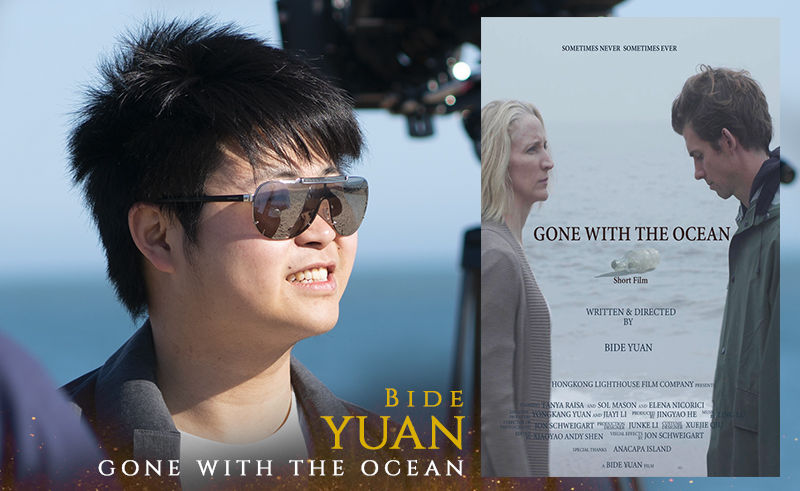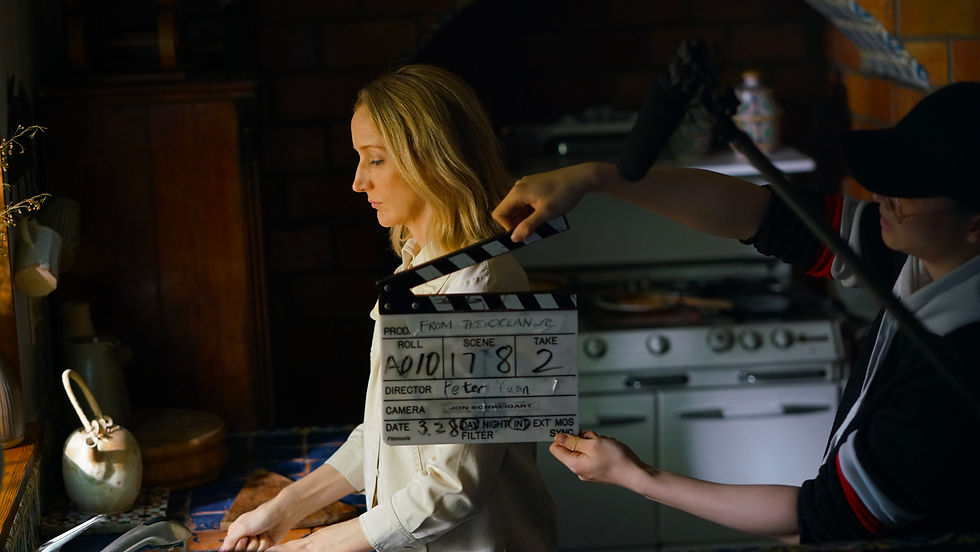An interview with Bide Yuan | GONE WITH THE OCEAN | VMA21 BEST DIRECTOR/SHORT | January Edition | By Silvia Nittoli

The ocean as a metaphor for the relationship between man and nature. The main difference between the two is that man can let you down, not fully comprehending and accepting you, while nature will always have the ability to host you and make you feel part of it.
Sometimes to understand this, you need to go through rejection, pain, and loneliness, and in part due to what used to be a loving relationship. This is the message of Gone With The Ocean, written and directed by Bide Yuan who had already dedicated to the ocean his previous 2019 short movie, From the Ocean.
• Bide, congratulations on your winning at the VMA. Your short movie, Gone With The Ocean, is about relationships and all the aspects involved (love, desperation, communication, etc). What was the inspiration for you to write a short movie about relationships?
The motive of making this film is that the ocean brings clouds, rain, and wind, and more than 70% of the earth is covered by the ocean, so no matter how we live on the continent, our human emotions are inextricably linked to the sea. For people living by the ocean, it is not only the wind and rain that come from the ocean but also the healing and feedback of the feelings we once poured out to the ocean, which is a kind of feeling.
• How much of your personal experience did you put into the characters' relationship and how much was it inspired by other people's experiences (friends, family members, etc)?
I had a painful emotional experience before, I want to express the loneliness, isolation, helplessness in this film, and this is a movie about cherishing the person in front of you.

I don't usually have a lot of emotional turmoil when I'm writing, but whenever I go on set and the actors and cameramen start shooting, my ideas keep coming and bursting out.
• There is a dual setting, the city, and the island. In what ways did you want to use this aspect to reach the goal (and also the tone) of your movie?
When I first designed this script, it was formed through my understanding of the ocean, that is, the relationship between man and nature. The city symbolizes human industrial civilization, while this barren island symbolizes nature, our relationship between man and nature, and this relationship between a man and a woman is the counterpart.
So Downtown L.A. represents a modern industry, and the island represents a natural environment, when Samuel which is the protagonist leaves the island and goes to the city, he is hit by the inability to find a job, he does not fit in with the people around him, but not Jackson on the island (that is, and Samuel is the same actor), he can still get the embrace and healing from nature on the island when his marriage is frustrated.
• How did you manage to deal with the crew and the two different locations. Did you shoot all at once on the island?
To be honest, until now, looking back, I still think it was a challenging task, we spent a total of 15 days shooting on various scenes, including Anacapa Island, and homes near the long beach, the indoor scenes were shot in Los Angeles, only the exterior scenes went to the island, I especially want to thank the entire crew for their cooperation and support. I would like to thank the entire crew for their cooperation and support because there is no house on the island to live in, Heather, the producer and I went to rent 5 tents and 12 sleeping bags, we are completely in accordance with the standard of camping to shoot the scenes on the island, plus water and food, we each carry more than 45lb of goods, before going to the island, Heather watched the weather forecast every day to update the island weather conditions and temperature, this allowed us to be fully prepared.

• The emotions of the characters escalate as the movie progresses. How did the music and the sounding help you in achieving this?
Ling Lu is my music composer, he helped me a lot, I really appreciate him, we sat down with each other and talked about the music almost for half years, yes, since the ideas came then we talked, so this is more like friends talking.
• You wrote and directed. Is there an aspect of filmmaking that you feel comfortable in delegating?
Making a film definitely requires teamwork, and I feel very comfortable leaving the production of my film to my producer, Heather, and Coco Li, who is in charge of the art side. They have saved me a lot of trouble, from costume selection to on-set art setup, and I think it's important to try to trust your crew at the beginning of the film and have some helpful conversations when things aren't going in the right direction so that we can proceed smoothly and according to plan!
• Did you have the same approach for the writing phase and the directing one or it is two different things for you?
It's a very different thing, I don't usually have a lot of emotional turmoil when I'm writing, but whenever I go on set and the actors and cameramen start shooting, my ideas keep coming and bursting out, which makes me comfortable but keeps the crew receiving new content, and I hope they like this kind of direction too.
I think it's important to try to trust your crew at the beginning of the film and have some helpful conversations when things aren't going in the right direction so that we can proceed smoothly and according to plan!
























